状语从句完整版课件66张
图片预览
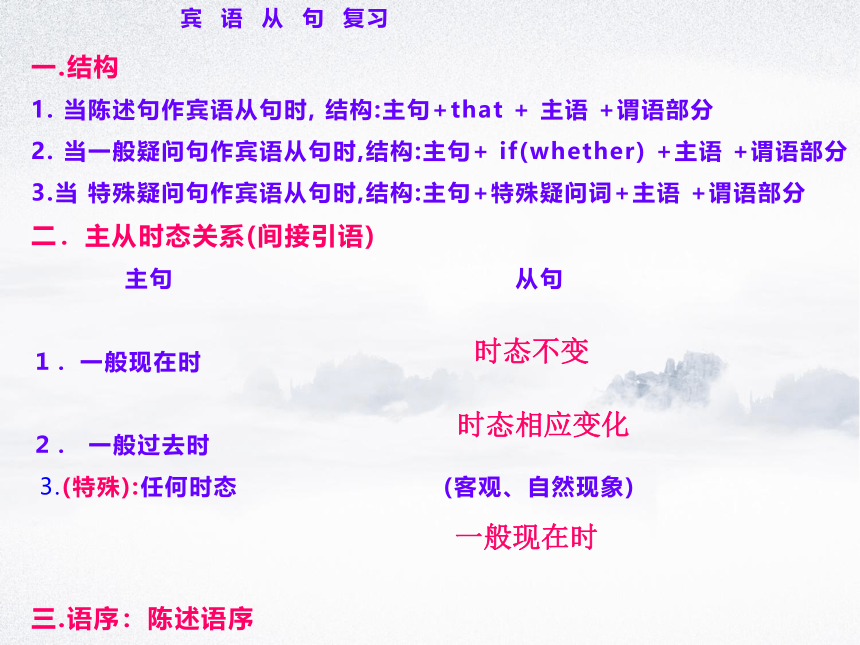
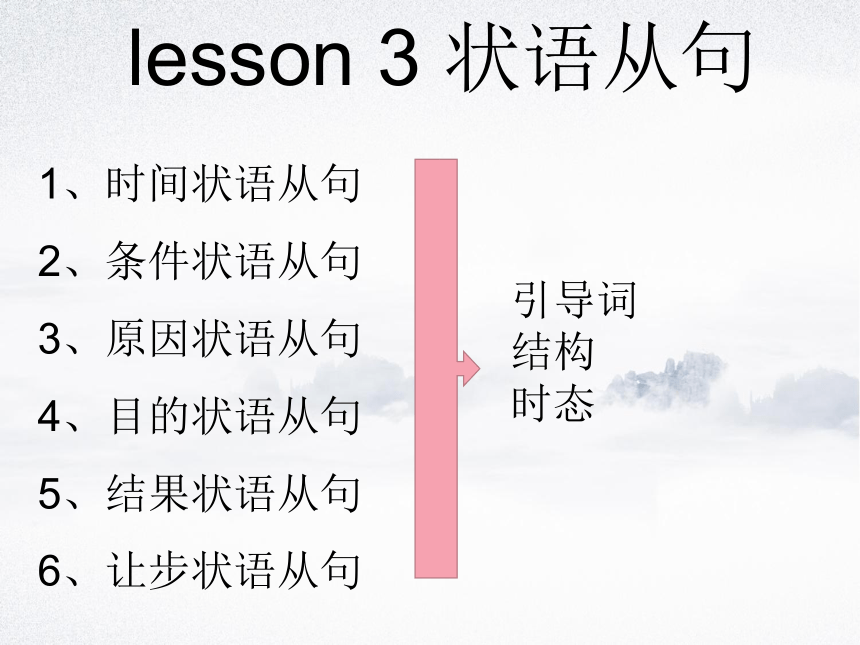
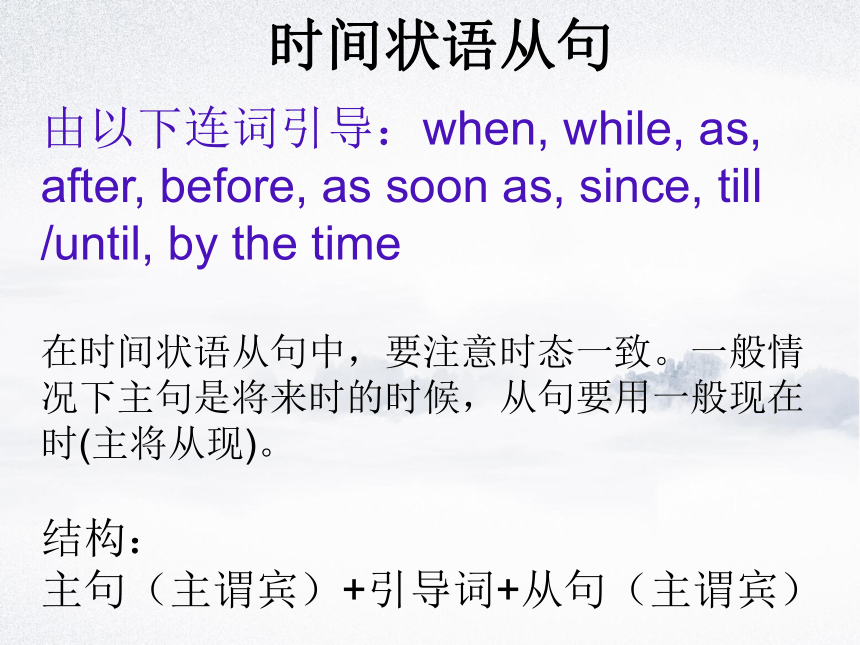

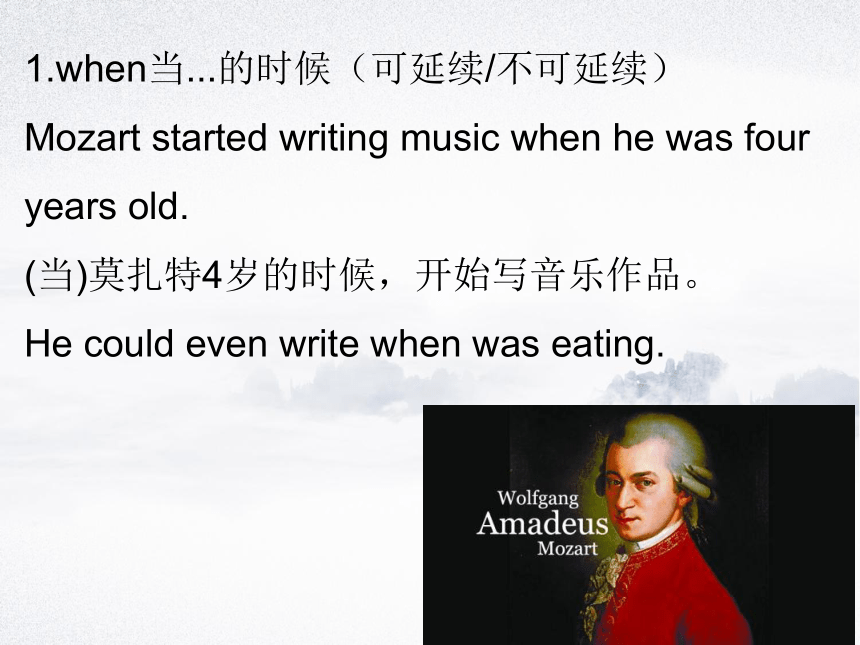

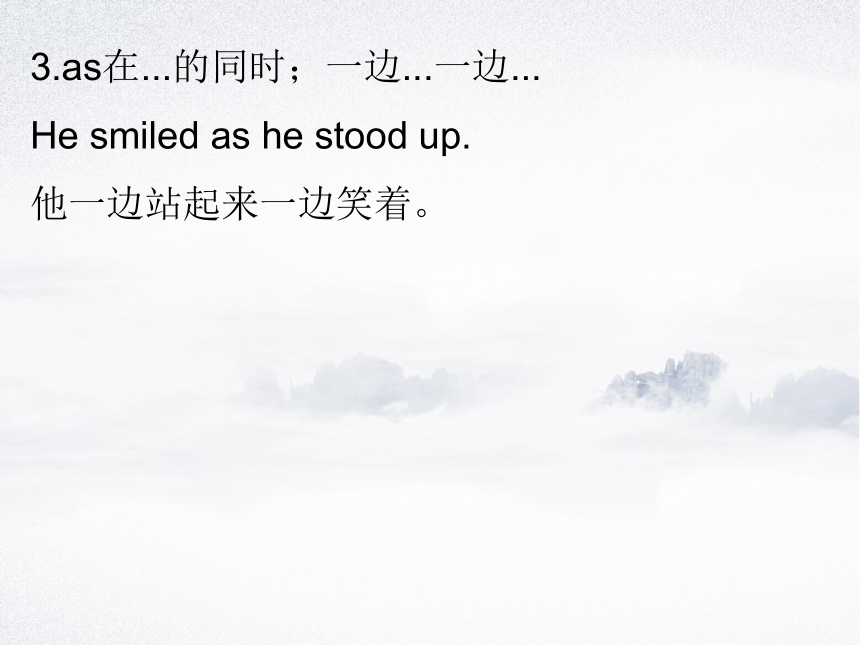
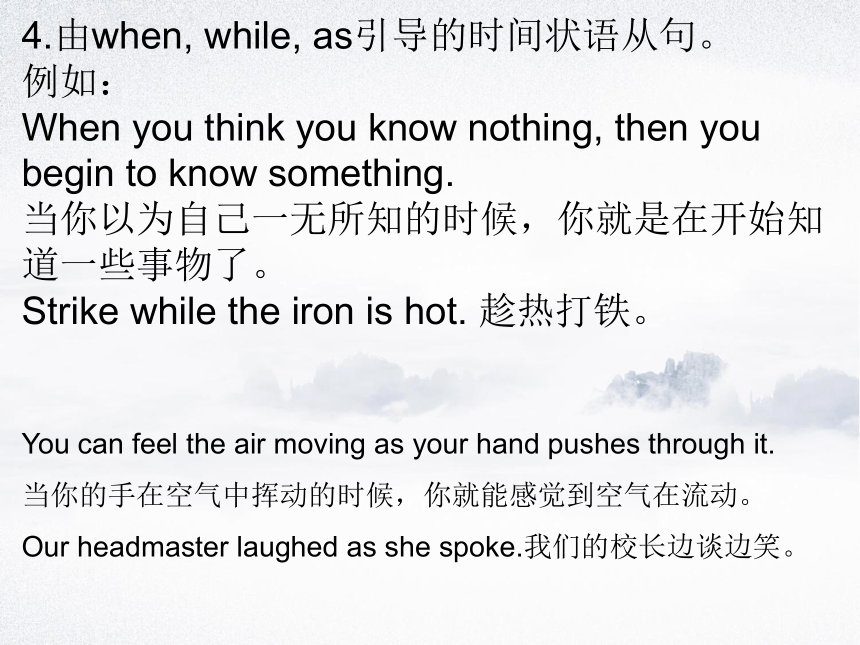
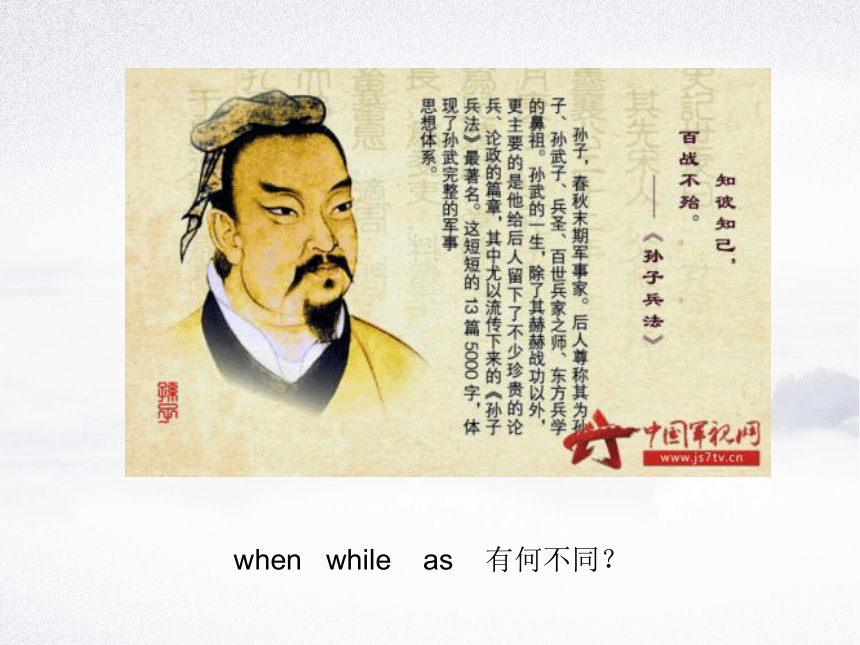
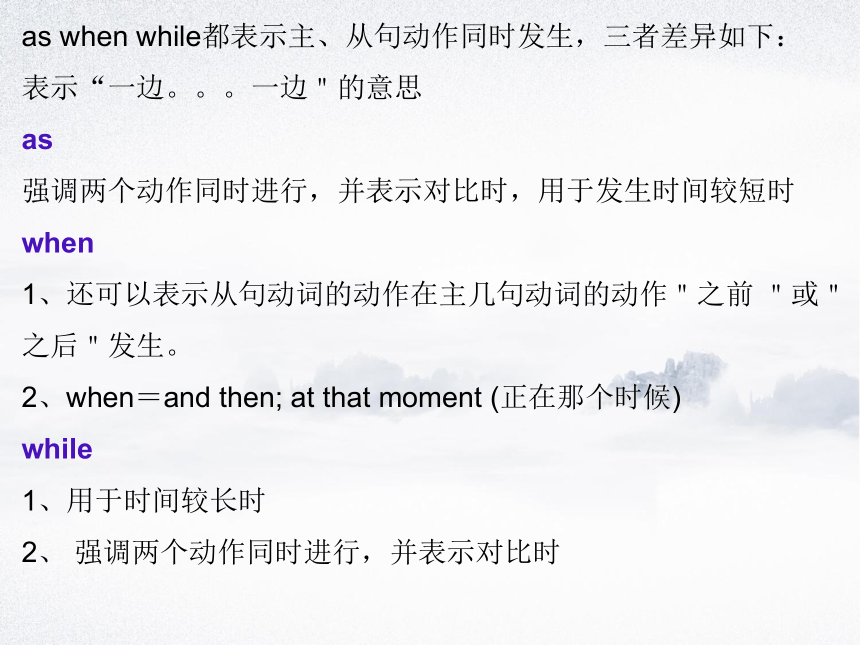
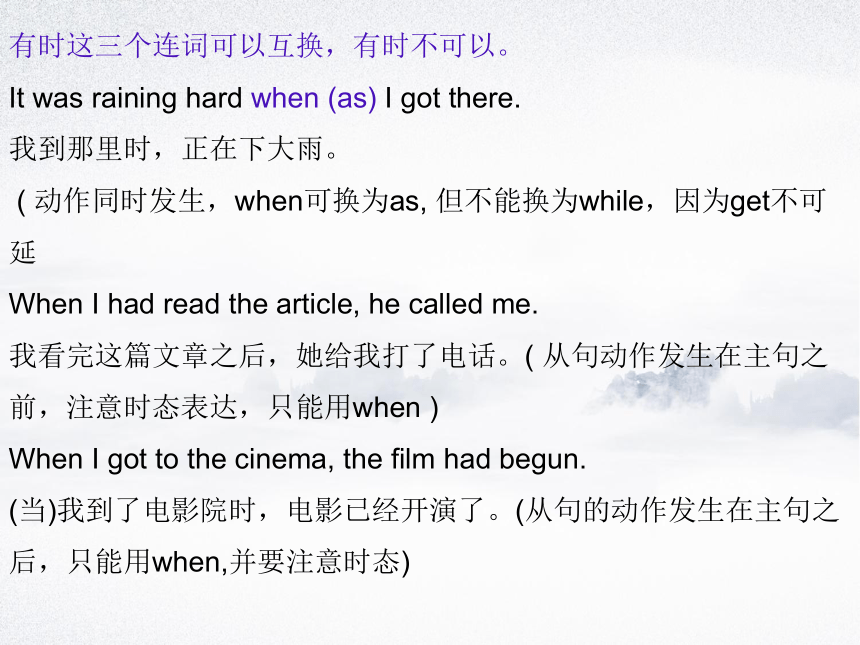
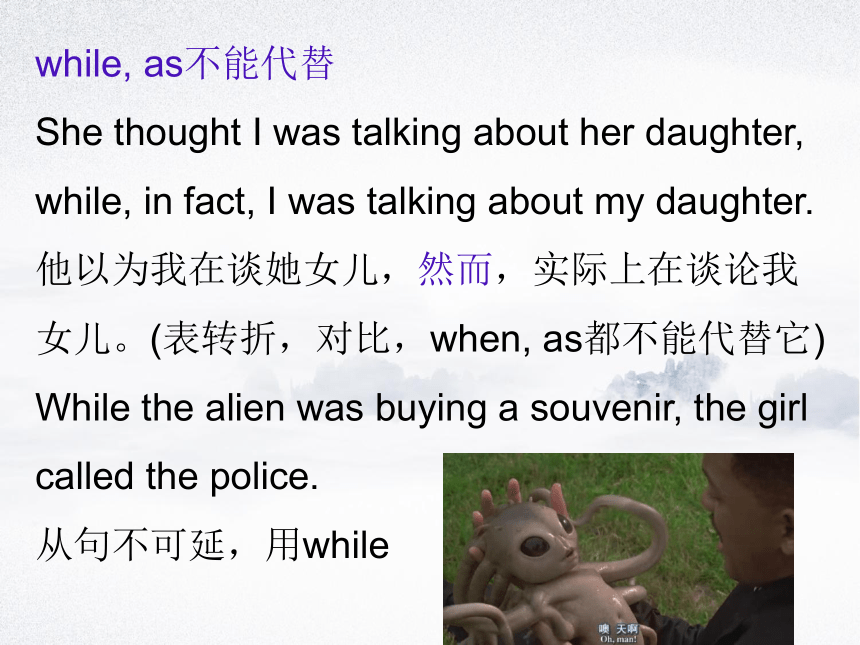
文档简介
(共66张PPT)
宾
语
从
句
复习
一.结构
1.
当陈述句作宾语从句时,
结构:主句+that
+
主语
+谓语部分
2.
当一般疑问句作宾语从句时,结构:主句+
if(whether)
+主语
+谓语部分
3.当
特殊疑问句作宾语从句时,结构:主句+特殊疑问词+主语
+谓语部分
二.主从时态关系(间接引语)
主句
从句
1.一般现在时
2.
一般过去时
3.(特殊):任何时态
(客观、自然现象)
三.语序:陈述语序
时态不变
时态相应变化
一般现在时
lesson
3
状语从句
1、时间状语从句
2、条件状语从句
3、原因状语从句
4、目的状语从句
5、结果状语从句
6、让步状语从句
引导词
结构
时态
时间状语从句
由以下连词引导:when,
while,
as,
after,
before,
as
soon
as,
since,
till
/until,
by
the
time
在时间状语从句中,要注意时态一致。一般情况下主句是将来时的时候,从句要用一般现在时(主将从现)。
结构:
主句(主谓宾)+引导词+从句(主谓宾)
1.when当...的时候(可延续/不可延续)
Mozart
started
writing
music
when
he
was
four
years
old.
(当)莫扎特4岁的时候,开始写音乐作品。
He
could
even
write
when
was
eating.
2.while当...时(只用于可延续)
He
visited
a
lot
of
places
while
he
was
traveling.
他在旅途中参观了许多地方。
He
came
home
while
Mozart
was
playing
the
piano.
3.as在...的同时;一边...一边...
He
smiled
as
he
stood
up.
他一边站起来一边笑着。
4.由when,
while,
as引导的时间状语从句。
例如:
When
you
think
you
know
nothing,
then
you
begin
to
know
something.
当你以为自己一无所知的时候,你就是在开始知道一些事物了。
Strike
while
the
iron
is
hot.
趁热打铁。
You
can
feel
the
air
moving
as
your
hand
pushes
through
it.
当你的手在空气中挥动的时候,你就能感觉到空气在流动。
Our
headmaster
laughed
as
she
spoke.我们的校长边谈边笑。
when
while
as
有何不同?
as
when
while都表示主、从句动作同时发生,三者差异如下:
表示“一边。。。一边"的意思
as
强调两个动作同时进行,并表示对比时,用于发生时间较短时
when
1、还可以表示从句动词的动作在主几句动词的动作"之前
"或"之后"发生。
2、when=and
then;
at
that
moment
(正在那个时候)
while
1、用于时间较长时
2、
强调两个动作同时进行,并表示对比时
有时这三个连词可以互换,有时不可以。
It
was
raining
hard
when
(as)
I
got
there.
我到那里时,正在下大雨。
(
动作同时发生,when可换为as,
但不能换为while,因为get不可延
When
I
had
read
the
article,
he
called
me.
我看完这篇文章之后,她给我打了电话。(
从句动作发生在主句之前,注意时态表达,只能用when
)
When
I
got
to
the
cinema,
the
film
had
begun.
(当)我到了电影院时,电影已经开演了。(从句的动作发生在主句之后,只能用when,并要注意时态)
while,
as不能代替
She
thought
I
was
talking
about
her
daughter,
while,
in
fact,
I
was
talking
about
my
daughter.
他以为我在谈她女儿,然而,实际上在谈论我女儿。(表转折,对比,when,
as都不能代替它)
While
the
alien
was
buying
a
souvenir,
the
girl
called
the
police.
从句不可延,用while
all
in
all
when最万能
while还有延伸的“然而”的意思
5.after在...之后
He
left
the
classroom
after
he
had
finished
his
homework
the
other
day.
前几天做完作业之后回的家。
after
过去的过去
过去
5.before
在...之前
Mr.
Brown
had
worked
in
a
bank
for
a
year
before
he
came
here.
布朗先生来这之前已经在一家银行里工作一年了。
before
过去的过去
过去
6.as
soon
as
一...就...
We
began
to
work
as
soon
as
we
got
there.
我们一到那就开始工作。
I
will
write
to
you
as
soon
as
I
get
home.
我一到家就给你写信。
7.since
自。。。以来
主句一般用现在完成时,从句用一般过去时。Mr
Green
has
taught
in
that
school
since
he
came
to
China
three
years
ago.
本句从句还可以用短语:since
three
years
ago(自三年前以来)
8
till
/until都可以作连词,连接时间状语,也可以作介词,与其它词构成介词短语,在句中作状语。
They
walked
till
/until
it
was
dark.
Xiao
Ming
didn’t
leave
home
till
/
until
his
father
came
back.
9.
by
the
time
到。。。为止
By
the
time
he
gets
there
,
his
father
has
already
gone.
By
the
time
I
got
to
school,
the
class
had
already
began.
lesson
3
状语从句
1、时间状语从句
2、条件状语从句
3、原因状语从句
4、目的状语从句
5、结果状语从句
6、让步状语从句
引导词
结构
时态
14.?The?new?secretary?is?supposed?to?report?to?the?manager?as?soon?as?she_____.?
A.?will?arrive??B.?arrives???C.?is?going?to?arrive???
15.?He?got?into?the?room?_____?the?telephone?rang.?A.?then???B.?when
?C.?while???
D.?so
16.?No?sooner?had?he?finished?his?talk?_____?he?
was?surrounded?by?the?workers.?
A.?as??B.?then??C.?than??D.?when?
条件状语从句
What
would
you
do
if
you
are
a
billionaire?
What
would
you
do
if
you
are
a
millionaire?
位置:从句可放在主句之前或之后,但是放在主句之前须有逗号隔开
eg:如果我有足够的钱,我就去环游世界
If
引导条件状语从句
定义:if
“如果,
假如”
它引导的句子表示某事发生所需的条件,即“在…条件下,某事才能发生”,在句子中充当状语,因此称之为条件状语从句。(
If引导的条件状语从句表示假如有从句的动作发生,就会有主句动作的发生
)
If
I
have
enough
money,
I
will
travel
around
the
world
.
=I
will
travel
around
the
world
if
I
have
enough
money.
条件状语从句
条件状语从句
构 成
从
句
主 句
时 态
If+一般现在时
主语+shall/will+动词原形
例 句
If
he
comes,
he
will
take
us
to
the
zoo.
If条件句:条件句用于陈述语气,表示假设的情况
可能发生,其中
if
是“如果”的意思。
主句一般将来时
,从句用一般现在时。(主将从现)
条件状语从句
用法:
1.
如果主句是一般将来时,从句则用一般现在时。
If
it
rains(从句),
I
will
stay
at
home.
I’ll
go
with
you
if
you
don’t
want
to
go
alone(从句).
2.如果主句含有must,
may,
can
等情态动词,从句也要用
一般现在时。
If
you
drive
too
fast,
you
may
have
an
accident.
You
must
stop
if
the
traffic
is
red.
If
you
finish
the
homework,
you
can
go
home.
如果你作业做完了就可以回家了。
If
you
want
to
lose
weight
you
must/should
eat
less
bread.
如果你想减肥,你必须少吃面包。
条件状语从句
3.
如果主句是祈使句,从句同样要用一般现在时。
Don’t
go
and
play
football
if
you
don’t
finish
your
homework.
Please
call
me
if
he
comes
next
Sunday.
1.If
he____________
(not,
do
it
),
I___________(do)
it.
2.If
you
____
(be)
late
for
school
,my
teacher
________(be)
angry.
3
If
she________
(win)
the
prize
,we
_______(be)
happy.
4.If
I
_________
(not,eat
)so
much
,I
_________(get)
thinner.
条件状语从句
5.If
you
______(tell)
them,
they
_____________
(not,believe)
you.
6
I
_________(stay)
at
home,If
it
__________(
rain).
7.If
it
____________(not,rain)
,I
_________(
go)
out.
8.
we
__________(play)
football,
If
it
is
_________(sun)
.
9.If
she
__________(become)
a
star
,her
parents
____________
(not,send)
her
away
1.If
he____________
(not,
do
it
),
I___________(do)
it.
2.If
you
____
(be)
late
for
school
,my
teacher
________(be)
angry.
are
will
be
3
If
she________
(win)
the
prize
,we
_______(be)
happy.
wins
will
be
4.If
I
_________
(not,eat
)so
much
,I
_________(get)
thinner.
5.If
you
______(tell)
them,
they
_____________
(not,believe)
you.
don’t
eat
will
get
tell
won’t
believe
6
I
_________(stay)
at
home,If
it
__________(
rain).
7.If
it
____________(not,rain)
,I
_________(
go)
out.
8.
we
__________(play)
football,
If
it
is
_________(sun)
.
9.If
she
__________(become)
a
star
,her
parents
____________
(not,send)
her
away
will
stay
rains
doesn’t
rain
will
go
will
play
sunny
becomes
won’t
send
doesn’t
do
will
do
条件状语从句
If
条件句的替代形式:
(1)祈使句
+
and/or
+
陈述句(谓语动词通常用将来时态)。其中,and表示句意顺承;or表示转折,意为“否则”。
e.g.
If
you
work
hard,
you’ll
pass
the
exam
easily.
=
Work
hard,
and
you’ll
pass
the
exam
easily.
If
you
don’t
work
hard,
you’ll
fall
behind
others.
=
Work
hard,
or
you’ll
fall
behind
others.
条件状语从句
(2)用介词with,
without的替代形式:
e.g.
If
there
is
no
water,
the
fish
may
die.
=
Fish
may
die
without
water.
If
you
help
me,
I’ll
finish
my
task
on
time.
=With
your
help,
I’ll
finish
my
task
on
time.
条件状语从句
条件状语从句
If
在宾语从句中翻译为“是否”
If
在条件状语从句中翻译为“如果”
I’ll
go
to
see
you
if
I
am
free
next
week.
I
want
to
know
if
he
is
a
teacher.
whether
1.
if
在句中的含义不同
条件状语从句
1.
Can
you
tell
me
if
she
can
come
to
the
meeting
?
2.
She
will
not
go
there
if
it
is
rainy
tomorrow.
3.
I
can’t
guess
if
she
will
be
angry
.
4.
If
we
help
each
other
,
we
will
get
good
results
.
条件状语从句
if的用法
2.引导条件状语从句:译为“如果,假如”
(1)
if从句+祈使句
(2)
if从句+主句(一般将来时)
(3)
if从句+主句(含有情态动词)
1.引导宾语从句:译为“是否”,表示不确定的概念。
I
don’t
know
if
your
father
can
come
together
.
Can
you
tell
me
if
miss
your
parents
?
条件状语从句
2.
条件状语从句
除非
只要
万一
条件状语从句
_____
weather
is
fine,
we
will
go
to
the
park
tomorrow.
You’d
better
take
an
umbrella
_______
it
rains.
I
sleep
with
the
window
open
_______
it’s
really
cold.
________
you
listen
to
me,
I'll
give
whatever
you
want.
If/
unless/
as
long
as
/
in
case
Afraid
of
being
late,
they
came
by
taxi.
因为怕迟到,所以他们坐出租车来的。
Thank
you
for
reminding
me
.
谢谢你提醒我。
I’ll
have
to
have
my
watch
replaced
because
there
is
something
wrong
with
the
alarm.
因为某件事(从句)造成什么结果(主句)
原因状语从句
引导词
Because,since,as等
因为
;
既然;
由于
语气强弱
because>
since>
as
because不知道原因
since原因明显,已知
as双方都知道
3.
原因状语从句
Because
Since
As
Because
表示直接的因果关系,常放主句后.
回答Why
问句
、
强调原因或有partly,
not修饰时
,只能用because.
Since
,
as
表示众所周知的原因,常放于主句前,译成“既然”.
Since
语气比as
强。
I
learn
English
partly
______
I
like
it.
______
everyone
is
here,
let’s
begin
the
meeting.
It
is
________
he
is
honest
that
he
gets
the
job.
because
Since
because
They
bumped
her
off
________
she
knew
too
much.
因为她知道太多,所以他们把她干掉了。
_____
you
are
free
today,
you
had
better
help
me
with
my
mathematics.
既然今天你休息,
你最好帮我补习数学。
____it
is
raining,
you’d
better
take
a
taxi.
因为在下雨,
你最好乘出租汽车。
原因状语从句
As
because
Since
原因状语从句
(1)回答why,只能用because。
A:Why
can’t
I
drive?
B:_______
you
are
too
young.
Because
(2)不能将because,
since,
as等与so连用。
_______
he
is
ill,
______he
cannot
come.
A.
Because,
/
B.
Because,
so
C.
Though,
but
D.
Though,
/
原因状语从句
(3)because和because
of
because+
从句
because
of+
名词短语
他因病不能来。
He
can’t
come
because
he
is
ill.
He
can’t
come
because
of
his
illness.
原因状语从句
引导词
so
that,in
order
that等
以便
为了
The
American
government
complained
China
so
that
they
can
distract
their
people's
attention.
为了。。。做某事
I
study
hard,
so
that/
in
order
that
I
may
not
fail
in
the
examinations.
目的状语从句
I
lent
him
$50
in
order
that
he
might
go
for
a
holiday.
我借给他50美元,以便他能去度假。
他早起以便他能够赶上首班车。
He
got
up
early
so
that
he
could
catch
the
first
bus.
谓语前常含有may,
might,
can,
could,
should,
would等情态动词。
目的状语从句
2、
in
order
to后面接动词,是简单句。
in
order
that后面加的是从句,是状语从句
He
got
up
early
in
order
to
catch
the
early
bus.
=
He
got
up
early
in
order
that
he
could
catch
the
early
bus.
目的状语从句
So
…
that
Such
…
that
adj/adv
名词
如此…以至于
He?has?made?_____?great?progress?that?
the?teachers?are?pleased?with?him.
He?is
____rich
?that?all
the
girls
in
this
company
wants
to
be
friends
with
him.
such
so
结果状语从句
The
dog
is
clever
that
everyone
likes
it.
It
is
clever
a
dog
that
everyone
likes
it.
It
is
a
clever
dog
that
everyone
likes
it.
They
are
clever
dogs
that
everyone
likes
them.
结果状语从句
当名词前有many/much/little/few时,只能用so
We
have
so
much
time
that
we
can
finish
the
job
well.
David
is
so
brave
a
boy
that
he
saved
two
girls
from
the
fire.
Fish
are
so
stupid
that
they
can
only
rememer
7
seconds.
David
is
such
a
brave
boy
that
he
saved
two
girls
from
the
fire.
These
are
such
stupid
fish
that
they
only
rememver
7
seconds.
There's
only
so
little
water
that
anyone
of
us
could
die
in
this
desert.
让步状语从句
让步状语从句一般翻译为“尽管……”或“即使……”,就是我们日常生活中用的“退一步说……”的感觉。
引导让步状语从句的连接词主要有以下这些:though,
although,while,as;
even
if,even
though;
whether...or...;
no
matter+疑问词,疑问词-ever,regardless
of+名词/名词短语/名词从句,despite,in
spite
of。
切记although,though
不可与but连用
让步状语从句
⑴though,although表示“虽然,纵然”。
这两个连词意思大致相同,在一般情况下可以互换使用。在口语中,though较常使用,although比though正式,二者不能与but连用。
例如:
Although/Though
he
was
exhausted,
he
kept
on
working.虽然他已经精疲力竭了,但仍然继续工作。
Although/Though
he
is
very
old,
he
is
quite
strong.
他虽然年纪大了,身体还很健壮。
让步状语从句
(2)although引导的让步状语从句位于主句之前的情况较多,though引导的让步状语从句可位于主句之前或主句之后。例如:
She
passed
the
examination
though
she
had
not
studied
very
hard.
她虽然不用功学习,考试却及格了。
让步状语从句
(3)as,though表示“虽然……但是”,“纵使……”。
as引导的让步状语从句必须以部分倒装的形式出现,但although不可以这样用。例如:
Object
as
you
may,I’ll
go.
=Though/Although
you
may
object,I’ll
go.
纵使你反对,我也要去。
Hard
as/
though
he
works,he
makes
little
progress.
=Though
he
works
hard,he
makes
little
progress.)
尽管他学习很努力,但几乎没取得什么进步。
让步状语从句
even
if,even
though
表示“即使……”,“纵使……”,含有一种假设。
它们常互换使用,但意义有细微差别。even
if引导的让步从句含有强烈的假定性,可用来表示与事实相反的假设,但不能用来描述已经发生的事实。
而even
though引导让步状语从句时,是以从句的内容为先决条件的,即说话人肯定了从句的事实,表示已经发生了的事。
例如:
We’ll
make
a
trip
even
if/though
the
weather
is
bad.
即使天气不好,我们也要作一次旅行。
Even
if
he
is
poor,she
loves
him.
(=He
may
be
poor,
yet
she
loves
him.)
即使他很穷,但她还是爱他。
Even
though
he
is
poor,she
loves
him.
(=He
is
poor,
yet
she
loves
him.)
尽管他很穷,但她还是爱他。
⑷whether...or...表示“不论是否……”,“不管是……还是……”之意。
Whether
you
believe
it
or
not,it's
true.
无论你是否相信,这都是真的。
(wether在宾语从句中,
weather要区分开
)
⑸“no
matter+疑问词”或“疑问词-ever”的含义为“……都……;不管……都……”
它们引导的让步状语从句可以互换。例如:
No
matter
what
happened,he
would
not
mind.
(=Whatever
happened,he
would
not
mind.)
无论发生了什么事情,他都不会介意的。
I
don't
care
wherever
you
go,
I'll
follow
you.
Whatever
you
want,
I'll
but
it
for
you.
总结:让步状语从句表示:虽然,尽管,即使等概念,由although,though(尽管,即使),however(无论怎样),whatever(无论什么),whoever(无论谁),whomever(无论谁),whichever(无论哪个),whenever(无论何时),wherever(无论哪里),whether(是否),no
matter
(who,what,where,when,etc)
(无论……),even
if(即使),even
though(即使)等词引导。
视频总结
宾
语
从
句
复习
一.结构
1.
当陈述句作宾语从句时,
结构:主句+that
+
主语
+谓语部分
2.
当一般疑问句作宾语从句时,结构:主句+
if(whether)
+主语
+谓语部分
3.当
特殊疑问句作宾语从句时,结构:主句+特殊疑问词+主语
+谓语部分
二.主从时态关系(间接引语)
主句
从句
1.一般现在时
2.
一般过去时
3.(特殊):任何时态
(客观、自然现象)
三.语序:陈述语序
时态不变
时态相应变化
一般现在时
lesson
3
状语从句
1、时间状语从句
2、条件状语从句
3、原因状语从句
4、目的状语从句
5、结果状语从句
6、让步状语从句
引导词
结构
时态
时间状语从句
由以下连词引导:when,
while,
as,
after,
before,
as
soon
as,
since,
till
/until,
by
the
time
在时间状语从句中,要注意时态一致。一般情况下主句是将来时的时候,从句要用一般现在时(主将从现)。
结构:
主句(主谓宾)+引导词+从句(主谓宾)
1.when当...的时候(可延续/不可延续)
Mozart
started
writing
music
when
he
was
four
years
old.
(当)莫扎特4岁的时候,开始写音乐作品。
He
could
even
write
when
was
eating.
2.while当...时(只用于可延续)
He
visited
a
lot
of
places
while
he
was
traveling.
他在旅途中参观了许多地方。
He
came
home
while
Mozart
was
playing
the
piano.
3.as在...的同时;一边...一边...
He
smiled
as
he
stood
up.
他一边站起来一边笑着。
4.由when,
while,
as引导的时间状语从句。
例如:
When
you
think
you
know
nothing,
then
you
begin
to
know
something.
当你以为自己一无所知的时候,你就是在开始知道一些事物了。
Strike
while
the
iron
is
hot.
趁热打铁。
You
can
feel
the
air
moving
as
your
hand
pushes
through
it.
当你的手在空气中挥动的时候,你就能感觉到空气在流动。
Our
headmaster
laughed
as
she
spoke.我们的校长边谈边笑。
when
while
as
有何不同?
as
when
while都表示主、从句动作同时发生,三者差异如下:
表示“一边。。。一边"的意思
as
强调两个动作同时进行,并表示对比时,用于发生时间较短时
when
1、还可以表示从句动词的动作在主几句动词的动作"之前
"或"之后"发生。
2、when=and
then;
at
that
moment
(正在那个时候)
while
1、用于时间较长时
2、
强调两个动作同时进行,并表示对比时
有时这三个连词可以互换,有时不可以。
It
was
raining
hard
when
(as)
I
got
there.
我到那里时,正在下大雨。
(
动作同时发生,when可换为as,
但不能换为while,因为get不可延
When
I
had
read
the
article,
he
called
me.
我看完这篇文章之后,她给我打了电话。(
从句动作发生在主句之前,注意时态表达,只能用when
)
When
I
got
to
the
cinema,
the
film
had
begun.
(当)我到了电影院时,电影已经开演了。(从句的动作发生在主句之后,只能用when,并要注意时态)
while,
as不能代替
She
thought
I
was
talking
about
her
daughter,
while,
in
fact,
I
was
talking
about
my
daughter.
他以为我在谈她女儿,然而,实际上在谈论我女儿。(表转折,对比,when,
as都不能代替它)
While
the
alien
was
buying
a
souvenir,
the
girl
called
the
police.
从句不可延,用while
all
in
all
when最万能
while还有延伸的“然而”的意思
5.after在...之后
He
left
the
classroom
after
he
had
finished
his
homework
the
other
day.
前几天做完作业之后回的家。
after
过去的过去
过去
5.before
在...之前
Mr.
Brown
had
worked
in
a
bank
for
a
year
before
he
came
here.
布朗先生来这之前已经在一家银行里工作一年了。
before
过去的过去
过去
6.as
soon
as
一...就...
We
began
to
work
as
soon
as
we
got
there.
我们一到那就开始工作。
I
will
write
to
you
as
soon
as
I
get
home.
我一到家就给你写信。
7.since
自。。。以来
主句一般用现在完成时,从句用一般过去时。Mr
Green
has
taught
in
that
school
since
he
came
to
China
three
years
ago.
本句从句还可以用短语:since
three
years
ago(自三年前以来)
8
till
/until都可以作连词,连接时间状语,也可以作介词,与其它词构成介词短语,在句中作状语。
They
walked
till
/until
it
was
dark.
Xiao
Ming
didn’t
leave
home
till
/
until
his
father
came
back.
9.
by
the
time
到。。。为止
By
the
time
he
gets
there
,
his
father
has
already
gone.
By
the
time
I
got
to
school,
the
class
had
already
began.
lesson
3
状语从句
1、时间状语从句
2、条件状语从句
3、原因状语从句
4、目的状语从句
5、结果状语从句
6、让步状语从句
引导词
结构
时态
14.?The?new?secretary?is?supposed?to?report?to?the?manager?as?soon?as?she_____.?
A.?will?arrive??B.?arrives???C.?is?going?to?arrive???
15.?He?got?into?the?room?_____?the?telephone?rang.?A.?then???B.?when
?C.?while???
D.?so
16.?No?sooner?had?he?finished?his?talk?_____?he?
was?surrounded?by?the?workers.?
A.?as??B.?then??C.?than??D.?when?
条件状语从句
What
would
you
do
if
you
are
a
billionaire?
What
would
you
do
if
you
are
a
millionaire?
位置:从句可放在主句之前或之后,但是放在主句之前须有逗号隔开
eg:如果我有足够的钱,我就去环游世界
If
引导条件状语从句
定义:if
“如果,
假如”
它引导的句子表示某事发生所需的条件,即“在…条件下,某事才能发生”,在句子中充当状语,因此称之为条件状语从句。(
If引导的条件状语从句表示假如有从句的动作发生,就会有主句动作的发生
)
If
I
have
enough
money,
I
will
travel
around
the
world
.
=I
will
travel
around
the
world
if
I
have
enough
money.
条件状语从句
条件状语从句
构 成
从
句
主 句
时 态
If+一般现在时
主语+shall/will+动词原形
例 句
If
he
comes,
he
will
take
us
to
the
zoo.
If条件句:条件句用于陈述语气,表示假设的情况
可能发生,其中
if
是“如果”的意思。
主句一般将来时
,从句用一般现在时。(主将从现)
条件状语从句
用法:
1.
如果主句是一般将来时,从句则用一般现在时。
If
it
rains(从句),
I
will
stay
at
home.
I’ll
go
with
you
if
you
don’t
want
to
go
alone(从句).
2.如果主句含有must,
may,
can
等情态动词,从句也要用
一般现在时。
If
you
drive
too
fast,
you
may
have
an
accident.
You
must
stop
if
the
traffic
is
red.
If
you
finish
the
homework,
you
can
go
home.
如果你作业做完了就可以回家了。
If
you
want
to
lose
weight
you
must/should
eat
less
bread.
如果你想减肥,你必须少吃面包。
条件状语从句
3.
如果主句是祈使句,从句同样要用一般现在时。
Don’t
go
and
play
football
if
you
don’t
finish
your
homework.
Please
call
me
if
he
comes
next
Sunday.
1.If
he____________
(not,
do
it
),
I___________(do)
it.
2.If
you
____
(be)
late
for
school
,my
teacher
________(be)
angry.
3
If
she________
(win)
the
prize
,we
_______(be)
happy.
4.If
I
_________
(not,eat
)so
much
,I
_________(get)
thinner.
条件状语从句
5.If
you
______(tell)
them,
they
_____________
(not,believe)
you.
6
I
_________(stay)
at
home,If
it
__________(
rain).
7.If
it
____________(not,rain)
,I
_________(
go)
out.
8.
we
__________(play)
football,
If
it
is
_________(sun)
.
9.If
she
__________(become)
a
star
,her
parents
____________
(not,send)
her
away
1.If
he____________
(not,
do
it
),
I___________(do)
it.
2.If
you
____
(be)
late
for
school
,my
teacher
________(be)
angry.
are
will
be
3
If
she________
(win)
the
prize
,we
_______(be)
happy.
wins
will
be
4.If
I
_________
(not,eat
)so
much
,I
_________(get)
thinner.
5.If
you
______(tell)
them,
they
_____________
(not,believe)
you.
don’t
eat
will
get
tell
won’t
believe
6
I
_________(stay)
at
home,If
it
__________(
rain).
7.If
it
____________(not,rain)
,I
_________(
go)
out.
8.
we
__________(play)
football,
If
it
is
_________(sun)
.
9.If
she
__________(become)
a
star
,her
parents
____________
(not,send)
her
away
will
stay
rains
doesn’t
rain
will
go
will
play
sunny
becomes
won’t
send
doesn’t
do
will
do
条件状语从句
If
条件句的替代形式:
(1)祈使句
+
and/or
+
陈述句(谓语动词通常用将来时态)。其中,and表示句意顺承;or表示转折,意为“否则”。
e.g.
If
you
work
hard,
you’ll
pass
the
exam
easily.
=
Work
hard,
and
you’ll
pass
the
exam
easily.
If
you
don’t
work
hard,
you’ll
fall
behind
others.
=
Work
hard,
or
you’ll
fall
behind
others.
条件状语从句
(2)用介词with,
without的替代形式:
e.g.
If
there
is
no
water,
the
fish
may
die.
=
Fish
may
die
without
water.
If
you
help
me,
I’ll
finish
my
task
on
time.
=With
your
help,
I’ll
finish
my
task
on
time.
条件状语从句
条件状语从句
If
在宾语从句中翻译为“是否”
If
在条件状语从句中翻译为“如果”
I’ll
go
to
see
you
if
I
am
free
next
week.
I
want
to
know
if
he
is
a
teacher.
whether
1.
if
在句中的含义不同
条件状语从句
1.
Can
you
tell
me
if
she
can
come
to
the
meeting
?
2.
She
will
not
go
there
if
it
is
rainy
tomorrow.
3.
I
can’t
guess
if
she
will
be
angry
.
4.
If
we
help
each
other
,
we
will
get
good
results
.
条件状语从句
if的用法
2.引导条件状语从句:译为“如果,假如”
(1)
if从句+祈使句
(2)
if从句+主句(一般将来时)
(3)
if从句+主句(含有情态动词)
1.引导宾语从句:译为“是否”,表示不确定的概念。
I
don’t
know
if
your
father
can
come
together
.
Can
you
tell
me
if
miss
your
parents
?
条件状语从句
2.
条件状语从句
除非
只要
万一
条件状语从句
_____
weather
is
fine,
we
will
go
to
the
park
tomorrow.
You’d
better
take
an
umbrella
_______
it
rains.
I
sleep
with
the
window
open
_______
it’s
really
cold.
________
you
listen
to
me,
I'll
give
whatever
you
want.
If/
unless/
as
long
as
/
in
case
Afraid
of
being
late,
they
came
by
taxi.
因为怕迟到,所以他们坐出租车来的。
Thank
you
for
reminding
me
.
谢谢你提醒我。
I’ll
have
to
have
my
watch
replaced
because
there
is
something
wrong
with
the
alarm.
因为某件事(从句)造成什么结果(主句)
原因状语从句
引导词
Because,since,as等
因为
;
既然;
由于
语气强弱
because>
since>
as
because不知道原因
since原因明显,已知
as双方都知道
3.
原因状语从句
Because
Since
As
Because
表示直接的因果关系,常放主句后.
回答Why
问句
、
强调原因或有partly,
not修饰时
,只能用because.
Since
,
as
表示众所周知的原因,常放于主句前,译成“既然”.
Since
语气比as
强。
I
learn
English
partly
______
I
like
it.
______
everyone
is
here,
let’s
begin
the
meeting.
It
is
________
he
is
honest
that
he
gets
the
job.
because
Since
because
They
bumped
her
off
________
she
knew
too
much.
因为她知道太多,所以他们把她干掉了。
_____
you
are
free
today,
you
had
better
help
me
with
my
mathematics.
既然今天你休息,
你最好帮我补习数学。
____it
is
raining,
you’d
better
take
a
taxi.
因为在下雨,
你最好乘出租汽车。
原因状语从句
As
because
Since
原因状语从句
(1)回答why,只能用because。
A:Why
can’t
I
drive?
B:_______
you
are
too
young.
Because
(2)不能将because,
since,
as等与so连用。
_______
he
is
ill,
______he
cannot
come.
A.
Because,
/
B.
Because,
so
C.
Though,
but
D.
Though,
/
原因状语从句
(3)because和because
of
because+
从句
because
of+
名词短语
他因病不能来。
He
can’t
come
because
he
is
ill.
He
can’t
come
because
of
his
illness.
原因状语从句
引导词
so
that,in
order
that等
以便
为了
The
American
government
complained
China
so
that
they
can
distract
their
people's
attention.
为了。。。做某事
I
study
hard,
so
that/
in
order
that
I
may
not
fail
in
the
examinations.
目的状语从句
I
lent
him
$50
in
order
that
he
might
go
for
a
holiday.
我借给他50美元,以便他能去度假。
他早起以便他能够赶上首班车。
He
got
up
early
so
that
he
could
catch
the
first
bus.
谓语前常含有may,
might,
can,
could,
should,
would等情态动词。
目的状语从句
2、
in
order
to后面接动词,是简单句。
in
order
that后面加的是从句,是状语从句
He
got
up
early
in
order
to
catch
the
early
bus.
=
He
got
up
early
in
order
that
he
could
catch
the
early
bus.
目的状语从句
So
…
that
Such
…
that
adj/adv
名词
如此…以至于
He?has?made?_____?great?progress?that?
the?teachers?are?pleased?with?him.
He?is
____rich
?that?all
the
girls
in
this
company
wants
to
be
friends
with
him.
such
so
结果状语从句
The
dog
is
clever
that
everyone
likes
it.
It
is
clever
a
dog
that
everyone
likes
it.
It
is
a
clever
dog
that
everyone
likes
it.
They
are
clever
dogs
that
everyone
likes
them.
结果状语从句
当名词前有many/much/little/few时,只能用so
We
have
so
much
time
that
we
can
finish
the
job
well.
David
is
so
brave
a
boy
that
he
saved
two
girls
from
the
fire.
Fish
are
so
stupid
that
they
can
only
rememer
7
seconds.
David
is
such
a
brave
boy
that
he
saved
two
girls
from
the
fire.
These
are
such
stupid
fish
that
they
only
rememver
7
seconds.
There's
only
so
little
water
that
anyone
of
us
could
die
in
this
desert.
让步状语从句
让步状语从句一般翻译为“尽管……”或“即使……”,就是我们日常生活中用的“退一步说……”的感觉。
引导让步状语从句的连接词主要有以下这些:though,
although,while,as;
even
if,even
though;
whether...or...;
no
matter+疑问词,疑问词-ever,regardless
of+名词/名词短语/名词从句,despite,in
spite
of。
切记although,though
不可与but连用
让步状语从句
⑴though,although表示“虽然,纵然”。
这两个连词意思大致相同,在一般情况下可以互换使用。在口语中,though较常使用,although比though正式,二者不能与but连用。
例如:
Although/Though
he
was
exhausted,
he
kept
on
working.虽然他已经精疲力竭了,但仍然继续工作。
Although/Though
he
is
very
old,
he
is
quite
strong.
他虽然年纪大了,身体还很健壮。
让步状语从句
(2)although引导的让步状语从句位于主句之前的情况较多,though引导的让步状语从句可位于主句之前或主句之后。例如:
She
passed
the
examination
though
she
had
not
studied
very
hard.
她虽然不用功学习,考试却及格了。
让步状语从句
(3)as,though表示“虽然……但是”,“纵使……”。
as引导的让步状语从句必须以部分倒装的形式出现,但although不可以这样用。例如:
Object
as
you
may,I’ll
go.
=Though/Although
you
may
object,I’ll
go.
纵使你反对,我也要去。
Hard
as/
though
he
works,he
makes
little
progress.
=Though
he
works
hard,he
makes
little
progress.)
尽管他学习很努力,但几乎没取得什么进步。
让步状语从句
even
if,even
though
表示“即使……”,“纵使……”,含有一种假设。
它们常互换使用,但意义有细微差别。even
if引导的让步从句含有强烈的假定性,可用来表示与事实相反的假设,但不能用来描述已经发生的事实。
而even
though引导让步状语从句时,是以从句的内容为先决条件的,即说话人肯定了从句的事实,表示已经发生了的事。
例如:
We’ll
make
a
trip
even
if/though
the
weather
is
bad.
即使天气不好,我们也要作一次旅行。
Even
if
he
is
poor,she
loves
him.
(=He
may
be
poor,
yet
she
loves
him.)
即使他很穷,但她还是爱他。
Even
though
he
is
poor,she
loves
him.
(=He
is
poor,
yet
she
loves
him.)
尽管他很穷,但她还是爱他。
⑷whether...or...表示“不论是否……”,“不管是……还是……”之意。
Whether
you
believe
it
or
not,it's
true.
无论你是否相信,这都是真的。
(wether在宾语从句中,
weather要区分开
)
⑸“no
matter+疑问词”或“疑问词-ever”的含义为“……都……;不管……都……”
它们引导的让步状语从句可以互换。例如:
No
matter
what
happened,he
would
not
mind.
(=Whatever
happened,he
would
not
mind.)
无论发生了什么事情,他都不会介意的。
I
don't
care
wherever
you
go,
I'll
follow
you.
Whatever
you
want,
I'll
but
it
for
you.
总结:让步状语从句表示:虽然,尽管,即使等概念,由although,though(尽管,即使),however(无论怎样),whatever(无论什么),whoever(无论谁),whomever(无论谁),whichever(无论哪个),whenever(无论何时),wherever(无论哪里),whether(是否),no
matter
(who,what,where,when,etc)
(无论……),even
if(即使),even
though(即使)等词引导。
视频总结
同课章节目录
- 词法
- 名词
- 动词和动词短语
- 动词语态
- 动词时态
- 助动词和情态动词
- 非谓语动词
- 冠词
- 代词
- 数词和量词
- 形容词副词及其比较等级
- 介词和介词短语
- 连词和感叹词
- 构词法
- 相似、相近词比较
- 句法
- 陈述句
- 一般疑问句和否定疑问句
- 特殊疑问句及选择疑问句
- 反意疑问句
- 存在句(There be句型)
- 宾语从句
- 定语从句
- 状语从句
- 主谓一致问题
- 简单句
- 并列句
- 复合句
- 主谓一致
- 主、表语从句
- 名词性从句
- 直接引语和间接引语
- 虚拟语气
- 感叹句
- 强调句
- 倒装句
- 祈使句
- 句子的成分
- 句子的分类
- 题型专区
- 单项选择部分
- 易错题
- 完形填空
- 阅读理解
- 词汇练习
- 听说训练
- 句型转换
- 补全对话
- 短文改错
- 翻译
- 书面表达
- 任务型阅读
- 语法填空
- 其他资料
